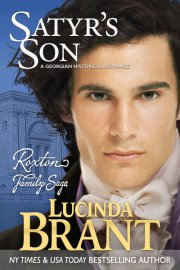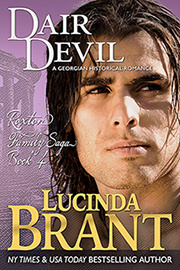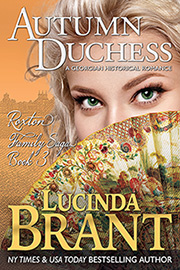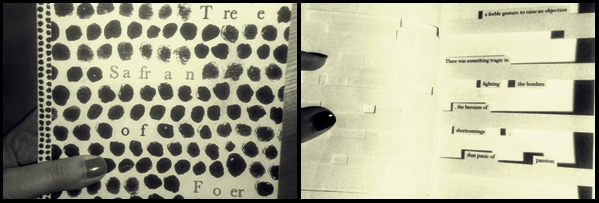As I have added two new reviews to my thoughts on the Roxton Family Saga by Lucinda Brant, I decided to post them all again. If you haven’t read this great series, combining sweeping historical romance with the traditional historical family saga, please pick it up soon.
Mari’s Reviews of The Roxton Family Saga(In reverse order, starting with the most recent release.)
 Satyr’s Son
Satyr’s Son
London, 1786. Lord Henri-Antoine has returned from the Grand Tour to a life of privilege and excess. A vast inheritance allows him every indulgence, free from responsibility. Yet, Henri-Antoine maintains a well-ordered existence, going to great lengths to conceal an affliction few understand and many fear.
Miss Lisa Crisp is a penniless orphan who relies on the charity of relatives to keep her from the poorhouse. Intelligent and unflappable, Lisa will not allow poverty to define her. She leads a useful life working among the sick poor.
Under startling circumstances, Henri-Antoine and Lisa meet. There is instant attraction. When they find themselves attending the same wedding in the country, Henri-Antoine offers Lisa a scandalous proposition, one she should refuse but yearns to accept. Following her heart could ruin them both.

In Satyr’s Son, the two most vibrant and visible children of the entire series, Teddy and Jack, find their happy-ever-after. (A match I predicted a few books ago, if anyone is counting). Teddy, daughter of Lady Mary Cavendish (Proud Mary), and Jack, brother of Deb, Duchess of Roxton (Midnight Marriage), each only had secondary or tertiary billing in past books, but nevertheless stole the scenes in their much-younger years.
However, they are not the central HEA, even though most of this book plays out at their wedding. (As such, I put forth the notion that Teddy and Jack were, in fact, robbed of their own book. I am hopeful these two will appear in the Roxton Family Letters, Volume Two, and would urge Brant to fill in the outlines of their story in a future bonus novella or short.)
Now, as to the actual hero and heroine of Satyr’s Son: Henri-Antoine (Harry), second son of Monseigneur, the former Duke of Roxton (Noble Satyr)—the great love of matriarch Antonia’s life—and brother to Julian, the current duke, is thumped in the head sideways by love of another commoner (following Christopher Bryce from Proud Mary), Miss Lisa Crisp, bosom friend of Teddy, niece to Antonia’s former lady’s maid, and beneficiary of the Duchess of Kinross’s quiet patronage.
The two main characters meet in the throes of the hero’s deepest vulnerability, and she manages to help him mask it from the rest of the world, which sets the stage for as many displays of ducal emotional armor as we ever saw with his father. Harry has been able to manage ill health his entire life with the help and support of enormous wealth, a loving, if intrusive, family, and the innate dignity instilled by Monsiegneur. His noble upset is handled with a different sort of grace than Monseigneur (and Antonia) always displayed, but grace nonetheless. His core fragility, however, is the perfect complement to his heroine’s core competencies.
Also complementary are their plans for each other—at first. As she is not of noble blood, he sees her as a mistress, and she agrees; how else will she spend time with a nobleman she is falling in love with, when he will surely have to marry in his own class? But Teddy, Jack, Antonia, and the rest of the family will not have it.
As his father did before him, he comes to what is left of his senses after Cupid’s assault, but requiring a similar sort of brick to the head as Monseigneur did when Antonia captivated him. Harry is not his father—he is more serious (by necessity), less frivolous, more intellectual, more goal-driven.
But he is similar enough. The haughtiness, the charm, the gloriously handsome physique, the seemingly blithe pursuit of pleasure, force a look backward: if the son invokes the “ducal defense” to cover up his great vulnerability, what then, was the father’s weakness? And in what ways did his heroine help him overcome it? Perhaps Monseigneur himself will be revealed in the next volume of the Roxton Letters.
As this has been billed as the last book in the Roxton Family Saga (barring the forthcoming epistolary Volume Two of the Roxton Letters), we can now bring some things full circle, and review the arc of the saga. There were many, many characters’ stories left unexplored in this series, among the most obvious, Teddy and Jack, and Estée and Vallentine. (Evelyn warrants a spin-off mystery series.) Since this is a specialty of Brant’s—tugging at threads of stories to create new books—one hopes for a “Next Generation” series, or more shorts, or some similar device to keep the Roxtons on the shelves for many years to come.
However, overall, from Noble Satyr to Satyr’s Son, she expertly weaves two genres into a comfortable whole: historical romance, of course, of the most glorious and sweeping sort; but also the traditional historical family saga, leading three generations through trials and tribulations equal to their great wealth and privilege.
Buy Satyr’s Son Here
 Proud Mary
Proud Mary
1770s Gloucestershire and Hampshire.
Widowed and destitute, Lady Mary Cavendish is left with only her pride. Daughter of an earl and great-granddaughter to a Stuart King, expectations demand she remarry. But not just any man will do; her husband must rank among the nobility. As always, Mary will do her duty and ignore her heart.
Country squire Christopher Bryce has secretly loved his neighbor Mary for many years. Yet, he is resigned to the cruel reality they are not social equals and thus can never share a future together. Never mind that his scandalous past and a heartbreaking secret make him thoroughly unworthy of such a proud beauty.
But with the help of a family ghost, and the never ordinary members of the Roxton family, Mary and Christopher realize that a happily ever after might just be possible.
 Review
Review
One thing Lucinda Brant does particularly well in The Roxton Family Saga, a perennial favorite of mine, is tugging at the strings of stories left hanging to be woven into later books. So, in this case, we get to know Lady Mary Cavendish, whom we have met ever-so-briefly in prior books: the ill-used wife of the obnoxious Gerald Cavendish. Now, however, Mary is a sensible widow in reduced circumstances, ready to do her duty by the Roxtons and her daughter, Teddy, marrying well to meet the demands of her family’s position.
Both Mary and her hero, country squire Christopher Bryce, are a healthy distance from the loftiest heights of the Roxton inner circle (as far away as Antonia ever allows any family member), and provide an earthy, almost-but-not-quite populist balance to earlier books (and, one hopes, new, more rigorous blood—and political philosophy—to the family tree). Mary is the most practical and pragmatic of Brant’s heroines thus far, and Christopher is almost too steady and comfortable to be a hero in a sweeping romantic novel, with an unremitting sense of duty similar to the Duke of Roxton.
The Roxton series is exceptionally good at showcasing the extravagant, over-the-top surroundings of a families of enormous wealth and aristocratic breeding. While characters do appear who are of more limited means or lesser class status (not usually both), the overwhelming majority of characters and settings highlight and glorify the opulence of the Georgian period. In this book, however, we are given a heroine who is of noble blood, but gentry spirit, and a hero with some money, but limited status.
As important as meeting the heroine of this book, we meet her daughter Teddy, whom we have also seen in brief flashes in prior books, but who has intrigued from her first appearance. She is central to her mother’s life, and so must be central to the reader’s attentions. The contrast between the irrepressible, headstrong Teddy and [all but one of] the other children in Brant’s books has always been especially marked, even if brief. Brant includes children—one cannot populate a multi-generational family saga without them. However, with two notable exceptions (I made a prediction months ago about them, which I shall reveal in due course), they are loved deeply by the central characters in the books, but to some degree sidelined in the narrative. This is, in part, the nature of children who have less life experience to draw from; in part, the “arms’ length” Georgian child-rearing system; and in part, the authorial privilege of backgrounding different parts of the story. But because of this shunting aside, when the compelling and arresting Teddy—who will never, ever allow herself to be shunted anywhere—walks onto the stage in Proud Mary, she is in full-color, larger than life. When she is in the proscenium, you will not be able to look away.
While Mary dithers, and Christopher quietly and competently ensures the safety of her family, each of these characters must come to terms in their own way with the fact that Christopher provides a sort of security to Mary and Teddy that cannot be bestowed by a title or instilled by great wealth.
Buy Proud Mary Here
 Dair Devil
Dair Devil
1770s London and Hampshire.
Alisdair ‘Dair’ Fitzstuart, hero of the American Revolutionary war and heir to an earldom, known by all as a self-centered womanizing rogue. But his dashing and rugged façade hides a vulnerable man with a traumatic past. He will gamble with his life, but never his heart, which remains his own.
Aurora ‘Rory’ Talbot, is a spinster and pineapple fancier who lives on the periphery of Polite Society. An observer but never observed, her fragile beauty hides conviction and a keen intelligence. Ever optimistic, she will not be defined by disability.
One fateful night Dair and Rory collide—the attraction is immediate, the consequences profound. Both will risk everything for love.
 Review
Review
Once again, Dair Fitzstuart is a hero I’m not inclined to like. He starts the book as a buffoon, more than anything else, thoughtless, indiscreet. But oh, so very handsome while he does it. My primary problem with Dair is that he too quickly throws off that bad boy image, and shows himself all that is decent and honorable. He lacks the darkness that imbued both Dukes of Roxton, and to a lesser extent, the Duke of Kinross, and that change in tone is a noticeable departure for the series. Dair is an unquestionable good guy. (And I admit, I like my heroes with a dash of villain.)
Rory, while his match in goodness, continues Brant’s tradition of heroines I can adore. She lives with a disability, but the limitations it presents are, in the main, self-imposed, and certainly not a barrier to her happy ending (if the hero has anything to say about it, and he does). She is a gentler, quieter personality than Brant’s other heroines, and is more a bluestocking, but no less opinionated or forceful or engaging.
Both hero and heroine, though, come to the first meeting with baggage, One thing I love about the Roxtons is that Brant never stints on the trials and tribulations, in this case, spying and political intrigue. She is very good at tying her books together by overarching story arcs and by intertwining characters in each other’s stories, so it is highly recommended her series be read in order, but it is by no means required.
Buy Dair Devil Here
 Eternally Yours: Roxton Letters Volume One
Eternally Yours: Roxton Letters Volume One
Previously unpublished letters from the private correspondence of the Roxton family, spanning 1743–1777, with extracts from the diaries of Antonia, 5thDuchess of Roxton and 7th Duchess of Kinross. Includes Roxton’s last letter to Antonia. Volume One complements the early chronology of the award-winning Roxton Family Saga: Noble Satyr, Midnight Marriage, and Autumn Duchess. With a foreword by a late-Victorian descendant, Alice-Victoria, 10th Duchess of Roxton.
 Review
Review
I have an inherent bias toward epistolary fiction, as it is among my favorite forms to write, including a forthcoming novel that is about a third correspondence and written commentary. However, because it is an area of particular literary interest, I am very picky about it.
Writing in a character’s written voice is a special skill, especially placed in a different era, where not only the tone was inherently different, but also the rhythms, the conventions, the level of formality. When a letter has to stand in place of hearing a voice or seeing a face, and must span time and distance, how do characters manage the emotional events of lives spent separated from loved ones in a way we, of Skype and email and international airlines, cannot fathom? Done poorly, it can destroy a book. Done well, with a deep understanding of the characters, the situations, and the times, it can add a layer of detail and depth that cannot be found in narrative and dialogue. How a man writes a letter is as distinct as his speech.
Now, consider writing letters not only for one character, but several. Not just an emotional event, but THE emotional events alluded to in the first three Roxton books. Brant is able to bring characters back who have left the Roxton family for one reason or another, and explain the genesis, or end result, of stories left untold in the series.
Brant’s book have made me laugh and cry; I would not read the entire catalog of an author who doesn’t. This book, though, was in a class by itself, emotionally speaking. In this volume, we say goodbye to some series favorites, finally learning the details of their fates, and are given hope for the future. (And there is a future planned for this series!) I am not a weeper, in the main, and am rather cynical, even (some days, especially) about romance novels, but this was a box-of-tissues-by-the-bedside book.
Buy Eternally Yours Here
 Autumn Duchess ***SPOILER ALERT***
Autumn Duchess ***SPOILER ALERT***
1770s England: Treat, the ancestral home of the dukes of Roxton.
Antonia, Dowager Duchess of Roxton, has mourned the loss of her duke for three long years. Her grief is all-consuming. Then into her life steps a most unconventional man.
Jonathon Strang, East India merchant and widower, lets nothing stand in the way of success, in business or in pleasure.
On spying Antonia, Jonathon is immediately smitten. He sees a beautiful woman who has not only lost the love of her life, and her exalted position in society, but is bullied, badgered, and totally misunderstood. She needs someone to talk to and a sympathetic shoulder to cry on.
Antonia’s opinion of Jonathon is less charitable. Insufferably arrogant. Overbearing. Dangerous. She must keep her distance. Better still, she will ignore him and pretend they had never been introduced.
 Review
Review
This book represented a radical change in the series, and as such, I could not review without spoilers. You can go see it on Goodreads at your discretion.





